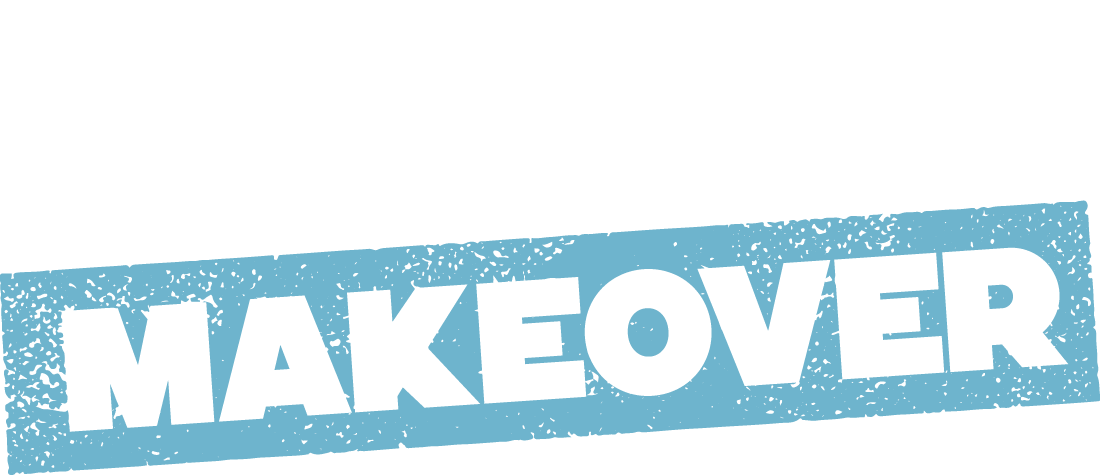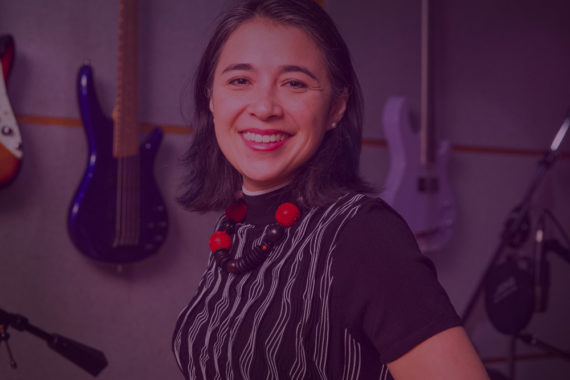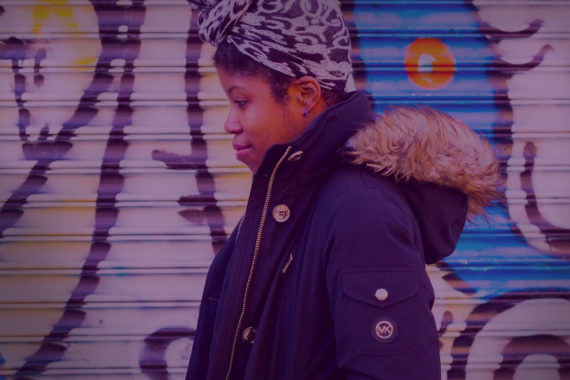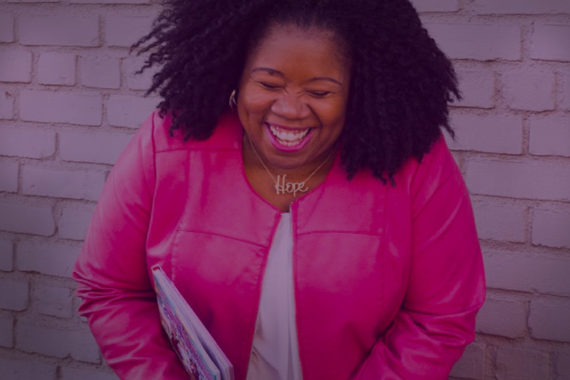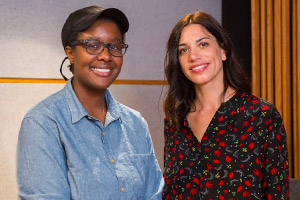
Morgen Bromell, Founder of Thurst (left), with guest
host Kellie Menendez (photo credit: Sandra Garcia)
Pipeline Angels member Kellie Menendez guest hosts and gets the 60-second pitch from Morgen Bromell of Thurst, an inclusive dating app for queer people of any gender. “I believe the future is queer,” Bromell says. Plus, the Legal Minute with Mitzi Chang of Goodwin. And, this week’s investor take from The Harnisch Foundation.
Music courtesy of Seven Seas Music (a Pipeline Angels portfolio company!)
EPISODE TRANSCRIPT
* indicates emphasis
Natalia: Hi everyone, my name is Natalia Oberti Noguera. I am the Host and Creator of Pitch Makeover and I’m also the founder and CEO of Pipeline Angels, where we are changing the face of angel investing and creating capital for women and non-binary femme social entrepreneurs.
Gina: And I’m Gina Delvac, the founding Executive Producer of Pitch Makeover. We’re taking the concept of a fashion makeover and applying it to startup pitches. Entrepreneurs pitch, we talk, and then we share some feedback on what they should keep, delete, and maybe even more important—add to their pitch. Our goal: help more voices—as Rihanna says—shine bright like the diamonds that they are.
And after the Pitch Makeover we have the Legal Minute with Mitzi Chang of Goodwin answering burning StartUp legal questions, followed by First Pitch, and stay to the end for this week’s Investor Take from Ruth Ann Harnisch of The Harnisch Foundation.
Kellie: [1:00] Welcome to Pitch Makeover! I’m Kellie Menendez, your host today. And I’m proud to be a Pipeline Angels member, and I’m here with Morgan Bromell of Thurst. Are you ready to pitch?
Morgan: Yes, I am.
Kellie: Okay. We’re going to do a one minute pitch.
Morgan: Okay.
Kellie: Ready? Go!
Morgan: Hi. My name is Morgan Bromell and I’m the Founder of Thurst. A few years ago, I had a *super* difficult time dating. Not because I’m not funny, or because my dating profile wasn’t setup correctly, but because I’m queer and the majority of dating apps were designed for people not like me. I realized that my friends who were trans, non-binary, or just looking for an app that affirmed their queerness, weren’t dating either. The majority of popular dating apps were either made by straight white men and best serve straight white men. So in order to improve my dating life and the dating lives of *millions* of queer people, I created Thurst, the first dating app for queer people of all genders.
Did you know that 56% of Americans aged thirteen to twenty identify as queer in some way? [2:00] We’re discovering that people are expressing themselves and living in their truest when we create safer, more affirming spaces. We create and design the future that we want today, and I believe that the future is queer. Thank you.
Kellie: Fifty-three seconds. Uhm can you repeat the stat that you mentioned? Aged thirteen to twenty? How many people identify as queer?
Morgan: Sure. So, right now it’s 56% of Americans aged thirteen to twenty identify as queer in some way. So, that’s the majority of teens and young Americans who are saying, “Hey! I think I’m on the queer spectrum.”
Kellie: And…what was your first, you know—what first made you want to do this? Did you, you know, look for an app out there? Or…?
Morgan: I did. Yeah. I tried *all* of them. I was like, “Okay, I just want to date like all of my other friends r, you know, co-workers who were like ‘oh, I’m going on a date this weekend.’” And I was like, “Why is it so difficult for *me* to date?” And I realized I was just filtering through a lot of guys and I was like, “I am not really trying to date you.” And I realized most of the platforms out there weren’t designed for me or my friends. [3:00] So we were dating the old school way which is going to a bar, maybe talking to some people. But that’s just not effective when you’re really busy. So…
Kellie: How do you fill out your profile in—within the Thurst app?
Morgan: So the Thurst app ideally makes the profile more expansive than other dating apps. So, it’s not rigid and you’re not defined by “I’m a gender looking for a certain gender,” but rather: “This is who I am,” and then you just search for other people in your area. So it allows people to kind of redefine what they’re actually looking for, but also define themselves in the most affirming way possible.
Kellie: Oh, great. I love that! So, you’re basically putting in the type of relationship you’re looking for an then going from there?
Morgan: Yes.
Kellie: Okay, great. Uhm, do you—how do you do this currently?
Morgan: So, right now I’m currently dedicating all of my time and energy into this and I’m working with two friends: one a designer and another person who is a developer. And we pretty much just, kind of, hack things together and get a lot of user feedback. So, my process is: build something, get feedback, fix bugs, and go back and build it again. So, it’s been pretty rad.
Kellie: Do you have [4:00] an age target?
Morgan: Well, initially I was just, kind of, building this for my own community. So my friends, I’d say young folk. But then I realized that it’s literally for everyone. Every queer person from all age groups, of all relationship styles, and even older folk who are saying, “Hey! There aren’t any platforms at all that acknowledge me, or that I exist and have romantic desires.” So…
Kellie: Another question that I had was actually: is this going to be for Americans only, or will it be global?
Morgan: It’s global. So, that was my idea, really. Opening up the idea of where queerness could operate. I think the misconception is that more western folk are queer or embracing queerness. But just through data and analyzing users who sign up to Thurst, I was like, “Woah! It’s in countries where being LGBTQ isn’t even allowed. Uhm so that’s been really powerful, just seeing where folk are trying to find other folk to just hang out with and connect with, apart from actually dating, has been really affirming and nice.
Kellie: Great. Are you ready for your Pitch Makeover?
Morgan: Yes. I am.
Kellie: Okay. Well, I would like you to keep most [5:00] of it.
Morgan: Okay.
Kellie: You did a really great job.
Morgan: Thank you.
Kellie: And some of the things that, you know, really struck me were the story that, you know, that you started out your pitch. How personal you made it. It was funny. It engaged me, and brought me into listening. I also liked the words that you used, things like “safer space.”
Morgan: Right.
Kellie: And that you had some stats in there. So, as far as deleting since we are a little under time: I don’t think you should delete *anything*, I think you should just expand on some of the good things that you brought to it.
Morgan: Okay.
Kellie: So, I would add in more of the scale of the solution: it’s global. There’s *a lot* of people that identify as a queer person looking for a relationship and I think just open up those numbers. More stats, more people, and the age range. So, it’s started out a little bit limiting: thirteen to twenty. And I thought, “Oh, is this for everybody? Or is this for a certain age range?” [6:00] And I think being more open with that brings it to a little bit more people.
One other thing I think that, maybe, just be very clear on your point of: people are looking for all types of different relationships and this gives people the opportunity to define what type of relationship they’re looking for.
To recap: I’d like you to keep your story and emotional aspects in there. I’d also like you to keep the stats that you currently have. Delete nothing. Instead, add more stats. And be more specific about the types of relationships that people can look for. And also, it’s a global opportunity, so use global numbers. Uhm, you’re getting people signed up all over the world, so, you know, put those stats in there. The larger stats open up the idea of queerness globally.
Morgan: Mhm.
Kellie: Morgan, are you ready to pitch again?
Morgan: Yes, I am.
Kellie: Ready? Set? Pitch!
Morgan: Hi. My name is Morgan Bromell and I’m the founder of Thurst. [7:00] A few years ago, I had a *super* difficult time dating. Not because I’m not funny, or because my dating profile wasn’t setup correctly, but because I’m queer and the majority of dating apps didn’t include folks like me. I also realized that my friends who were trans, non-binary, or just looking for an app that affirmed their queerness, weren’t dating either. The majority of popular dating apps were either made by straight white men and best serve straight white men. So in order to improve my dating life and the dating lives of *millions* of queer people, I created Thurst, the first dating app for queer people of all genders.
Did you know that 56% of Americans aged thirteen to twenty identify as queer in some way? We’re discovering that people are expressing themselves and living in their truths when we create safe spaces. Globally, users of all ages are trying Thurst to find connections. From friendships to various types of partnerships. With my team: one designer and another developer, we’re aiming to create a solution for the roughly twelve million Americans, including 2.4 Americans over fifty, and millions of international queer folk.
We create and design [8:00] the future that we want today, and I believe that the future is queer. Thank you.
Kellie: That was excellent! Without your pause, you would have been exactly at a minute. [Laughs]
Morgan: Oh, wow! That’s awesome.
Kellie: So, I thought that was pretty excellent. What did you think of your second pitch?
Morgan: It felt much better. It felt more comprehensive and included stats that folks might want to hear. So, yeah, thank you for the feedback.
Gina: Next up is the Legal Minute with Mitzi Chang. Stay tuned after that for First Pitch.
I’m here with Mitzi Chang from Goodwin for the Legal Minute. Mitzi, what are the most common mistakes that you as an attorney have to fix for entrepreneurs who didn’t talk to a lawyer soon enough?
Mitzi: So, that is a great question. I would say one of the items that I’ve been kind of having to fix, over…probably the last year, that I’ve noticed, is documentation issues. So, you incorporate your company and, you know, maybe you use a, kind of, template document but you don’t really ask anybody if this is the right [9:00] documentation. So it can cause a lot of problems. You know, whether you’re issuing stock and maybe that stock is not at the right value. Whether you’re incorporating a company as an LLC but really you should have done it as a C-Corporation. All of these things are fixable but it’s much more expensive to do it on the back-end. You know, when maybe you’re looking for investors and you need to clean it all up. It’s much better to think about it, talk to a lawyer, and make sure that you have the right documentation first so that you don’t have to, kind of, clean up the messes later.
Gina: Thanks Mitzi.
Mitzi: Thanks!
Gina: Now we’re back with entrepreneur Morgan Bromell and our segment First Pitch.
Kellie: When was the first time that you ever pitched?
Morgan: The first time I ever pitched was at Tech Crunch, actually, for a pitch competition in New York. So, I was living in Brooklyn at the time and they were like, “Hey do you want to pitch? Like, it’s just an open event.” And I was like, “Sure.” And it was—I was so nervous, I was in front of a crowd of hundreds of people and I literally just got up on the stage and started talking about my startup. [10:00] So…that’s what happened.
Kellie: Yeah, how did it go? How did you feel it went?
Morgan: I was super nervous. But then I just felt the energy and warmth of the host and it went pretty well. I actually won second place in that pitch competition. So it was my first pitch and it was nice to win and get stickers and pats on the back and stuff like that.
Kellie: So, you’re a natural!
[Both laugh]
That’s great. What was the feedback that they gave you?
Morgan: The feedback pretty much was, like, bringing a lot of stats. So at the time I started—wasn’t even beta phase, we were still working on development and just, like, basic figuring out what’s what. So it was a lot of information about, like, what queerness is, and what people are looking for, and solving this immediate problem just with an idea.
Kellie: Right. So, more education?
Morgan: Right, exactly. Yeah. A sense of education.
Kellie: What was your most recent pitch?
Morgan: My most recent pitch was actually to a friend. So, the friend—who’s a designer—I was like, “Please come work with me and this is my pitch.” I find a lot of pitching isn’t actually to investors but also to people who you want to join your team or support you in other capacities. So, that was a pretty important pitch because I was like, “Please work with me.” [Laughs] But yeah, it worked out well.
Kellie: What did you add, delete [11:00], or change when you pitched to your friend versus somebody, you know, on a stage or to a…
Morgan: Right. Uhm, so I took out the stats and I added more personal effects on what I plan on doing, how I’m working on the StartUp, and just my work processes so that they could understand, like, my motivation of wanting them to join that team, and what us working together could potentially look like. So it was a more personable pitch, but it’s still the same vibe. So…
Kellie: I still think those stats would resonate.
Morgan: Yeah! [Laughs] I think so, too.
Kellie: Morgan, I really appreciate you coming and explaining this problem. Uhm…you know, it’s really great to have more voices address other problems that other people might not be aware of. And I think one of the biggest opportunities that we have is to not downplay these issues and just to really bring awareness to other people.
Morgan: Thank you.
Kellie: So, today’s Pitch Makeover Tip is [12:00] don’t downplay the opportunity. This was a global product and it’s, you know, just let the people know that it is.
Morgan: Yes, thank you. I appreciate that.
Kellie: Thank you for joining us.
Morgan: Thank you so much for having me.
Kellie: This is Pipeline Angels member, Kellie Menendez, signing off.
Gina: This season’s Investor’s Take is brought to you by Ruth Ann Harnisch and The Harnisch Foundation. And today’s Investor’s Take is pay attention to reactions. And Natalia, this sort of strikes me like adaptability. What’s a way that entrepreneurs should be thinking about gauging other people’s reactions and being adaptable?
Natalia: One of my favourite signature events that we have at Pipeline Angels is our pitch summits. And we actually invite entrepreneurs. We generally have eight to ten who have been invited to present to our members for a chance to secure funding. We invite them to stay for the whole day and one of the reasons I like doing that: number one is because oftentimes [13:00] the process out there in the real—you know, like, in the status quo, is so opaque. Like, the entrepreneurs are all lined outside these mahogany doors that are closed and then each one goes in and out one-by-one, not knowing what’s really happening. And instead, at our pitch summits, the entrepreneurs stay for the whole day and also get to hear each other pitch, and also get to hear the feedback that our members have. And I will say, sometimes we have one or two members who *always ask the same question*. And it’s fascinating to see which entrepreneurs catch on and actually end up integrating that question so they’re actually anticipating that question already and they’re including it in their pitch because guess what, they’re *adapting* to the situation, they’re adapting to what they’re observing and seeing that is important for the investors. You know, like, in terms of their interests etc. So, I’d say that that’s a way that—hey entrepreneurs, you know, like, if you remember this Investor’s Take from Ruth Ann Harnisch [14:00], you can differentiate yourself.
Gina: Thanks again to Ruth Ann and The Harnisch Foundation.
Gina: Subscribe to Pitch Makeover anywhere you’re listening now including GooglePlay or Apple Podcasts where we’d love for you to leave us a review. More information and show notes are at pitchmakeover.com and we’re everywhere on social media @PitchMakeover.
Natalia: Thanks for joining us. This has been Pitch Makeover. Now go out and take over!
